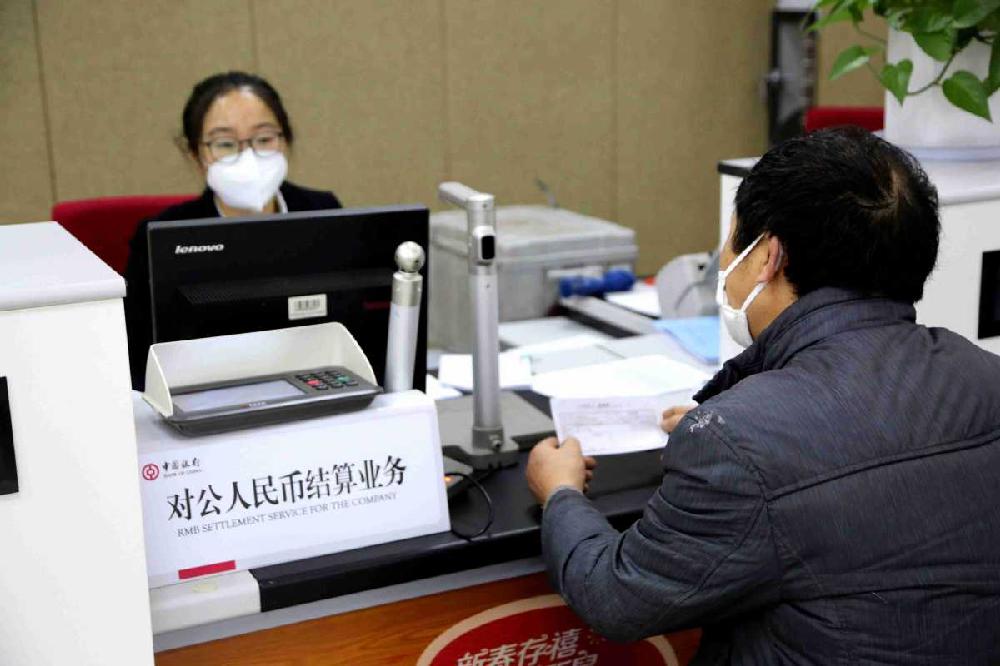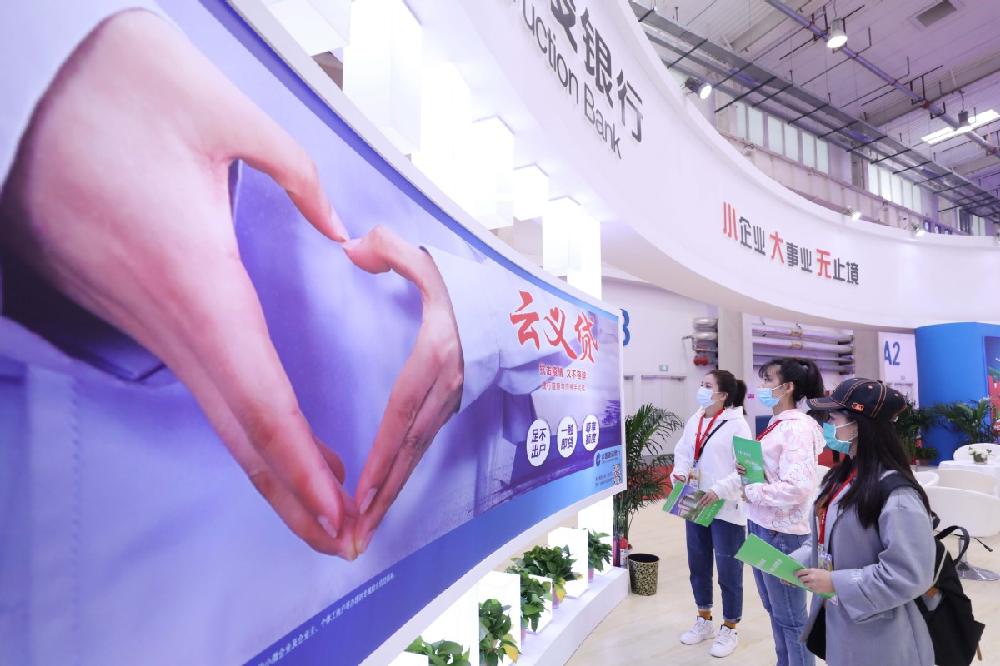
A bank employee helps a customer with corporate settlement services at a Bank of China branch in Lianyungang, Jiangsu province, on Feb 24. WANG CHUN/FOR CHINA DAILY
High-quality development goal set to help small companies and technology firms
Macroeconomic observers see China maintaining a moderate and consistent monetary policy this year.
They also expect more targeted incentives to boost growth of key sectors and shore up weak links.
Among the beneficiaries of such a policy will be the private sector, small businesses and technology firms as the country pursues high-quality development, they said.
Peng Wensheng, chief economist with China International Capital Corp, said in an interview on Thursday that while the country's economy is robustly bouncing back toward pre-COVID-19 levels, a comparatively relaxed monetary environment is still needed to effectively cope with the evolving coronavirus impact and help more businesses stay afloat.
"A tweak of magnitude in monetary policy, if any, is likely to take place in a gradual, moderate manner this year," Peng said, adding that many businesses, especially in the services sector, have been hit particularly hard in the outbreak and need more time to recover.
In recent weeks, the People's Bank of China, the central bank, has pledged in its quarterly and annual meetings that it will make money supply and aggregate social financing grow at basically the same level as the country's nominal economic growth this year.
It will implement a prudent monetary policy that is flexible, precise, reasonable and moderate. The central bank also said it will pay attention to the ideal timing, extent and impact of policies, and maintain the necessary support for economic recovery.
It will also deepen the reform of its interest rate system, and make borrowing more accessible and affordable to smaller businesses in the private sector.
Peng said that notable efforts have been made in recent years by State-owned commercial banks to scale up lending to smaller businesses.
However, while visible progress has been made in inclusive finance, financing needs of smaller businesses still remain acute.
"In addition to sufficient liquidity, targeted steps are needed to tackle financing woes.
Effective steps are needed to boost the confidence of commercial banks, and their readiness and capacity in lending," said Peng, an author of two award-winning books on financial circles, interest rate reforms and their impact on China's economy in the past five years.
Wu Ge, chief economist at Changjiang Securities, said growth momentum will likely see a robust pickup in the first quarter, considering the virus-induced slump in the same period last year.
Interest rates are likely to climb moderately, adding to a marginal rise in financing costs for businesses. Against such a backdrop, targeted policies are particularly needed to ensure accessible financing for smaller businesses.
Since August 2019, the PBOC has helped cut smaller firms' financing costs through reform of the loan prime rate, now the country's de facto lending rate, in an effort to break the invisible lower lending limit for loan prices in a market-oriented manner.
Peng said while the reform have successfully nudged more lending to smaller firms, more needs to be done to reduce the cost of finance to smaller firms.
"Incentive mechanisms for lending to small and micro companies for commercial banks must be improved to share with businesses in weal and woe," he said. "Real economy and financial institutions are interdependent, and shall grow and thrive with one another."
China's Ministry of Finance issued a revised performance evaluation rules for commercial banks on Jan 4, settling a new set of performance benchmarks for them.

Visitors check out a promotional video for China Construction Bank loan products during a financial expo in Beijing in October. CHEN XIAOGEN/FOR CHINA DAILY
The new gauges aim to be in line with national development goals and the real economy. The four previous performance benchmarks were profitability, business growth, asset quality and solvency.
Wen Bin, chief analyst at China Minsheng Bank, said the new benchmarks will effectively encourage State-owned lenders to more actively participate in serving national strategy and supporting real economy.
"The PBOC has also recently issued a regulation to cap property loans by banks, which means the amount of liquidity flowing to the real estate sector will be limited," Wen said. "The combination of these policy steps will effectively guide liquidity into the real economy."
In a similar vein, Li Keaobo, a senior researcher at the Academic Center for Chinese Economic Practice and Thinking at Tsinghua University, said he believes the new benchmarks will effectively "pull commercial banks from their previous dilemma of striking a proper balance between the mandate of boosting smaller businesses and ensuring a certain level of profitability.
"The previous benchmark, which includes the level of profitability, has pushed commercial banks to constantly give loans to the real estate sector, pivoting away from other sectors in the real economy."
The Central Economic Work Conference held in December focused attention on the country's weak spots in industries and said that China will ensure better implementation of key projects targeting breakthroughs in key technologies and solutions to bottleneck-problems, forging new cutting-edge technologies.
It will also boost its ability to achieve self-sufficiency in its industrial chains and supply chains.
Wen, the Minsheng Bank analyst, said this could mean more financing support will be needed for high-tech and manufacturing businesses. Innovative models must be launched to link them with support from commercial banks.
"The pilot model of venture loans is a possible measure to encourage commercial banks and innovative, technological firms to share gains and risks together," Wen said, referring to the loan trial model piloted in 2016 that allowed commercial banks to participate in combined debt-equity investments in startups and small businesses.
Wen said he believes this pilot will be expanded this year.
Wu from Changjiang Securities, on the other hand, believes that a more developed multi-tier capital market is strongly needed to channel funds into such firms, as innovative and technological businesses mostly bear greater risks that conventional lenders are willing to take. He said he believes more efforts will be rolled out in this regard this year.